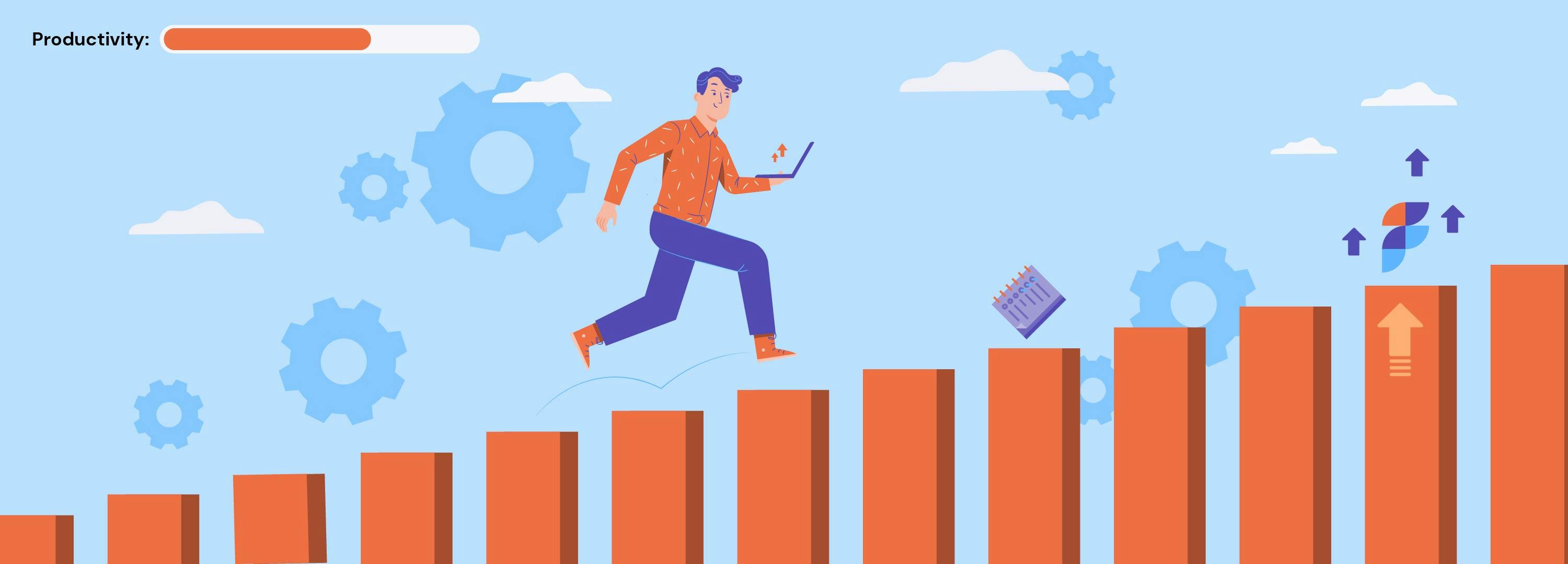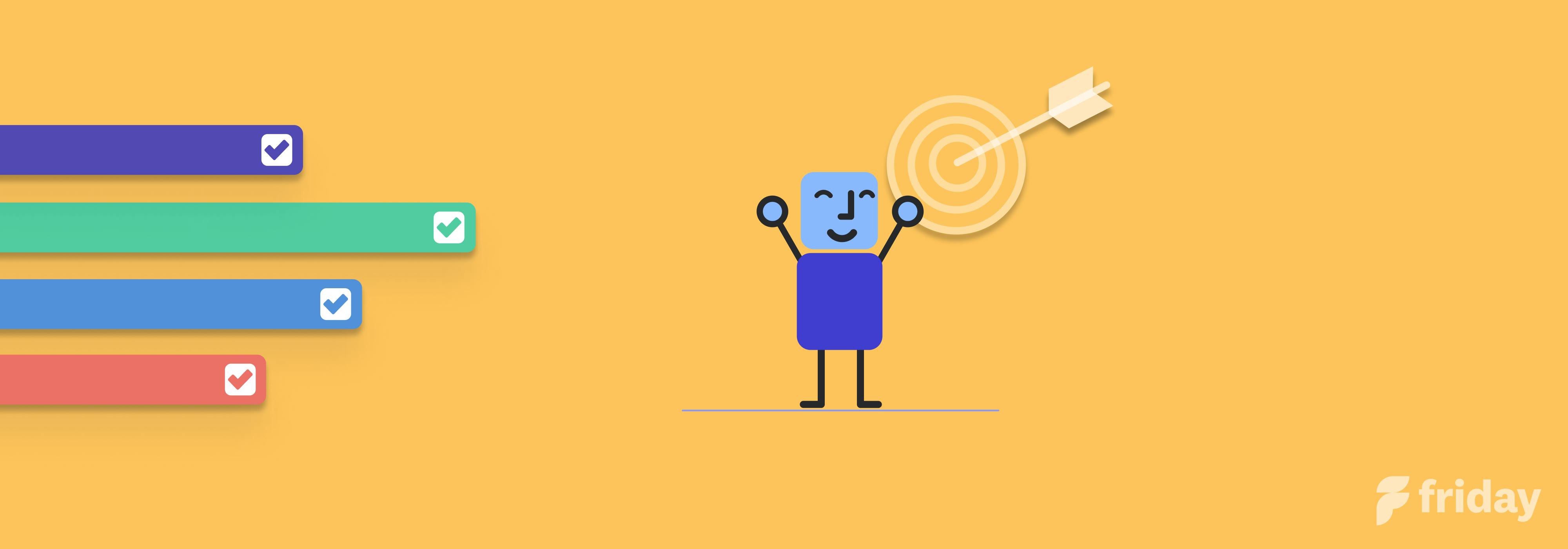How To Make Time Go Faster at Work: 10 Ways To Help

“Time and tide wait for no man,” goes an ancient English proverb. Well, if that were true in all cases, there wouldn’t be such a thing as a slow work day. We’ve all felt the eternal drone of a Wednesday, the mid-week slump, but how can time seem to move slower from one day to the next?
Our perception of time rests on what we’re doing and how we’re feeling.
If your time in the office is dragging, you should evaluate the way in which you get work done, as well as how your mood can be influenced by colleagues or the general working environment.
Thankfully, there are ways of making your day go faster, based on the foundation of enacting healthier working practices, including a productivity system or two.
Why Time Moves Slowly
It’s difficult to reach a shared understanding of such an abstract topic, though academics have plenty of ideas on why the flow of time seems to be inconsistent at points:
- Acknowledgement: If you spend too much time looking at your watch or tracking time, time will appear to be moving slowly. Watch the second hand count out a minute and you’ll start to wonder if a minute has always been that long. Unfortunately, the revelation that time feels slower makes the situation even more unbearable.
- Disengagement: When doing an activity, whether active or passive, your brain is preoccupied over that time span. That’s why you may be surprising at how many hours have passed on a particularly busy morning. Conversely, when you’ve got nothing to do, you’re disengaged and more susceptible to boredom.
- Anticipation: Research has discovered that time seems especially slow when we’re excitedly anticipating something in the future, for instance a party later in the week or a trip next month. This is even truer for impulsive people, who have great difficulty waiting for things to happen.
- Negative Feelings: There are many emotional states that may lead you to perceive time as going more slowly. Waiting uncomfortably for a doctor’s appointment is a prime example of when your mood can lengthen those ticks and tocks. A stressful time at work feels longer for the very same reasons you’d call it a rough day.
Ways of Making Time Go Faster at Work
The question probably shouldn’t be how to make time go faster, but rather how to have a better time at work. With that in mind, here’s our top 10 ways of doing both:
1. Stop Clock Watching
“A watched pot never boils,” as the adage goes, so it’s no surprise that constantly checking the time makes any day seem longer.
Not only does incessant awareness of time stop you from deep focus, a phenomenon known as chronostatis suggests that the very act of clock-watching also slows things down.
You can try this now, assuming you have a clock with a second hand. Stare at some object, or point in space, before quickly averting your eyes towards the timepiece. Continue to peer back and forth and you’ll soon notice the clock appears to take longer jumping to the next second.
Imagine the effect this will have on you throughout the workday, where seconds appear longer each time you look at the clock.
The more attention you commit to the passage of time, the less significant progression seems. If you have a meeting coming up, try setting an alarm instead of relentless clock-watching.
2. Keep a To-Do List
As your to-do list is a roadmap for your day, it reduces the time you spend staring blankly at the wall, wondering what it is exactly you should be doing.
They’re incredibly powerful pieces of paper, despite being the most basic form of task management.
In fact, the Ivy Lee productivity method relies solely on the simple creation of a 6-item list as means to maintain concentration through the day. For context, Lee was a man who got paid thousands of dollars as a productivity consultant, before such a position officially existed.
When drafting up your task-list, try to add challenging tasks. Not only will they demand more focus, meaning that you’re not obsessing over time, they’ll give you a greater sense of accomplishment. Space out these harder tasks to avoid fatigue. Having some quick wins between can keep you inspired, as well as reduce to-do list anxiety.
3. Pursue Meaningful Work
If you don’t love your work, or at least find enjoyment in much of what you do, trying to make time go faster really is a losing battle. More often than not, the sensation of time moving slowly stems from boredom, which is closely connected to engagement.
While you may not be the space-cowboy that your 7-year old self aspired to be, it’s imperative that you find your work meaningful and thus stimulating. Consider your strengths and weaknesses against your preferences in order to determine your favorite job characteristics, which will give you some indication of where to find fulfilling work.
Your frame of mind is just as influential on work engagement, as the famous anecdote of JFK at NASA teaches us. On a 1962 visit to the space center, President Kennedy asked one janitor what he was doing. “I’m helping put a man on the moon,” he replied, showing that meaningful work can be anything, providing you have the right mindset.
4. Practice Time Blocking
Time blocking is a productivity system through which tasked are assigned as many blocks of time as necessary. It works on the premise of single-tasking, fully committing to one aim, which accommodates deep focus and thus makes time go faster.
In order to time block, one has to find an environment relatively free from distractions, which includes large imposing clocks that are just begging you to look at them. Using a time, whether analog or digital, concentrate only on your goal.
By dividing the hours into blocks, you effectively trick yourself into thinking time is going quicker, largely because you are establishing clear transitional stages of the work day. Your schedule is broken into single-focus chunks that are easily measured, so you feel more productive, hence engaged.
5. Enter Flow State
In psychology, flow is a state of peak performance, which can only be brought about when skill level is matched with challenge. It’s colloquially known as being in the zone, and those who experience such are so engrossed in their work that they simply do not recognize distractions or have perception of time.
Although there’s no surefire way of entering flow state, you can increase the chances by following a few principles.
First, the work in question must be challenging or else it won’t demand your full attention. Second, the goal must be clear and believed to be attainable. Third, the individual’s skills and abilities must be well-matched to the task at hand.
By nature, flow state distorts one’s sense of time because the conscious mind is completely occupied. Your internal body block, on the other hand, still regulates physiological functions so be sure to eat, hydrate and use the restroom before you sit down to work. Otherwise, you may find yourself being suddenly dragged out of precious flow state.
6. Eat the Frog
“A man should swallow a toad every morning so that he might meet with nothing more disgusting during the rest of the day,” read an 1872 copy of the Evening Post. It was this phrase that birthed Eating the frog, a productivity system that involves dealing with your most intimidating tasks before all else.
The science shows that procrastination is closely linked to time perspective. Procrastinators tend to be present-oriented, meaning they prioritize immediate gains, which manifests as “low levels of structured and purposed time.” Eating the frog is an example of future-oriented behavior, where you delay gratification in order to feel better later.
Putting off unpleasant jobs or responsibilities can increase anxiety and create guilt, which will generally make you more attentive to the time. Your frog will continue to nag you throughout the work day, whereas eating it means you are free to work on the next tasks without the extra clock-watching caused by procrastination.
7. Respect your Ultradian Rhythm
You’ve probably heard of the circadian rhythm, our natural rest cycle governed by sleep hormone melatonin. Despite this lengthy lunar slumber, it turns out that our bodies quite like resting in the day, too. This ultradian rhythm is essentially our intrinsic work pattern, which is generally considered to be 90 minute performance and 20 minute rest.
When you work for extremely long, uninterrupted durations, you eventually feel quite burnt out. This is especially true for high-concentration tasks like research and analysis, as opposed to moderate (meeting, discussion) or low (reading, admin). If you don’t take sufficient breaks, your energy levels will plateau and time will really start to drag.
You can create a daily schedule that respects this biological rhythm by ensuring you’re giving yourself enough rest time. Stopping for a chat, doing a physical activity, or even light reading are all good things to place between larger chunks of work. If you’re unable to take regular breaks, you should still rotate high, moderate and low-concentration tasks so that you don’t overexert.
8. Take Opportunities to Have Fun
Another classic line is that “Time flies when you’re having fun,” quite a profound summary of our terrible time-keeping skill, and how influential it is to be actively engaged in activities. If you want work to feel faster, and indeed if a manager wants their team to be more productive, you have to take opportunities to have good fun.
A few silly traditions, regular compliments (Kudos!) and laugh or two between colleagues can create a much more welcoming environment. At the same time, casual conversation throughout the day can stop corporate jargon overflow, while innovative meeting structures can shake up monotonous situations.
The benefits of creating such a workspace are obvious, namely that people feel connected to their team and focused on their jobs. Companies that truly promote fun in the workplace see greater levels of productivity, evidence that not only does time fly when having fun, but work too.
9. Reward Yourself
When you’ve committed a lot of time to a task, or set thereof, it’s extremely productive to reward yourself, mainly because you condition yourself to actually want to further set and achieve goals.
It doesn’t matter how you motivate yourself to finish work, the very fact you are motivated will make the day go faster. Companies use reward systems to incentivize effort, whilst building towards a healthier work culture. On an individual level, it’s not much different.
Having a system whereby you reward yourself with self-care activities, or perhaps a special purchase, means your work has measurable outcome that’s relevant to you. With greater reason to crack on with work, you’re more likely to enter flow state, where hours will start to fly by.
10. Think Positively
No one will dispute that positive thinking is immensely powerful. On a slow work day, a good attitude can stop you going insane. By making some simple preparations, you can position yourself in a stronger place to think positively.
Playing some upbeat music will definitely enhance your mood, though it’s no use if you are the sort of person who can’t focus over a melody. Even just considering your work in terms of your accomplishments done, as opposed to tasks remaining, can help the office hours along.
There’s no limit to how you can positively influence your state of mind. It may be a funny desk pet that cheers you up whenever you glance over, or maybe some inspirational quotes pinged to you periodically through the day. You can use a mood tracker to discover potential triggers and effective remedies, which may increase your self-awareness and help you keep your cool.
How Friday Can Help You Organize Your Team Communication & Work.
How can you keep up with your remote team, even if you’re not working in the same place or at the same time? Friday is your homepage for work.
Friday automates status updates, provides check-ins, and helps teams feel connected while avoiding another meeting.
Your team will have a solution that they love to use, while also integrating with your specific tech stack, including team communication, calendars, and project management tools.
Pricing:
- Free Forever. To-Do List + Calendar Sync + Check-ins + Posts + Unlimited Users.
- Individual Pro: $4 per month. Planner View + Task/Calendar sync + Posts + Goals + Reporting


